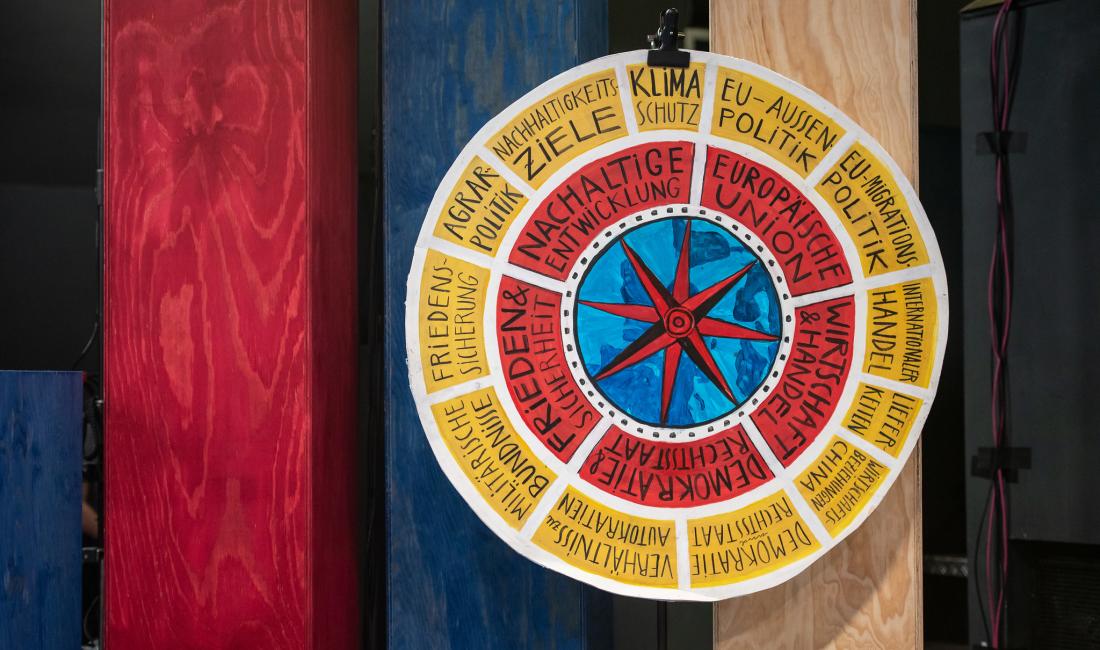On 20 February, the Citizens’ Assembly on Germany’s Role in the World came to an end and the results of the Assembly’s ten online meetings were published. The citizens’ recommendations on Germany’s global position was handed over to the Bundestag on 19 March to be used in policy-making.
The randomly selected Citizens’ Assembly met online in January and February to discuss Germany’s place in the world. During the preparation phase social actors and all parliamentary groups decided on sustainable development; peace and security; economy and trade; democracy and the rule of law; and the EU as the five thematic areas that the Assembly should deliberate on. After 50 hours of small-group and plenary discussions, the Assembly comprising of 154 participants reflecting the German population came up with recommendations for each thematic area as well as guiding principles that span over all five areas.
In the area of sustainable development, the Assembly recommends putting climate protection, sustainability, the right to clean water and the fight against world hunger in the centre of Germany’s political action. Sustainability should be included in the Basic Law and a sustainability ministry should be established to coordinate other ministries. Together with the EU, Germany should work for sustainable energy, mobility and agriculture and support research and development in the field of sustainability. In general, sustainable behaviour should be promoted, for example by including it in the curriculum at all educational levels.
The Assembly thinks that Germany’s military engagement should be based on the protection of human rights and the assistance of its allies. The Bundeswehr should be a modern and efficient army of specialists that thoroughly plans and evaluates its peacekeeping operations and respects local cultures in international operations. Preventive action should be taken early, and it should focus on promoting democracy, education, and fair and sustainable trade. In addition, the Assembly recommends the provision of transparent, reliable, and comprehensible information on Germany’s military engagements to strengthen the public opinion.
In economy and trade, Germany should defend fairness, transparency, human dignity, and sustainability. In addition, the interests of economically weaker countries should be considered. Germany’s international trade should rely on innovation, know-how, and quality. Free trade should be supported but a German supply chain legislation should be established to ensure good social, environmental, and human rights standards. This should also be done within Europe and in the long term internationally. When it comes to Germany’s relationship with China, on the one hand Germany should use its good bilateral relationship for cultural exchange and learning about digitalisation, and for promoting human rights, fair trade, and environmental protection. On the other hand, the trading power of China should be counterweighted by acting in solidarity with other democratic states.
Together with its partners, Germany should use its influence to promote human rights and the rule of law in the world. When there are violations, Germany must take a clear stand and address the violations publicly. Germany should also work together with its allies to distribute the seats and the voting rights of the UN Security Council in a fair and democratic way. The veto possibilities should be revised, and the EU should have a permanent seat.
According to the Assembly, Germany has a greater global role as a member of the EU than it could have alone. However, EU’s ability to act should be strengthened, and one way to do it would be to ensure that foreign policy decisions are made by qualified majority. The EU should also have an autonomous foreign and security policy that does not depend on the foreign policies of individual member states. Many recommendations in the area of the EU are related to migration. The number of refugees must be reduced by combating the reasons of fleeing and the inhumane conditions at EU’s external borders must be changed. In addition, Germany should work for reforming the common asylum policy.
As guiding principles, the Assembly concluded that Germany has the global role of a fair partner and mediator who works together with others to make sure that the world remains a good place to live for future generations. This should be done by committing to global sustainability and climate protection, and by focusing on protecting human rights, the rule of law, peace, and security around the world. It is possible for Germany to become a role model for other countries if it consistently lives up to these ambitions and does it in an inspiring and innovative way. To become a role model, Germany would also have to be transparent and self-critical in its actions and learn from others.
Claudine Nierth, spokesperson for the board of Mehr Demokratie, one of the initiating organisations, admits that Germany’s role in the world was a very challenging topic but sees the Citizens’ Assembly as an instrument that is “suitable to expand and strengthen our parliamentary democracy", especially when it comes to concrete and specific issues. Citizens’ assemblies are an international trend and similar citizens’ assemblies on a national level have recently been organised or are being planned in several European countries, including France, Denmark, and Ireland. If citizens’ assemblies are established as political instruments, they can become a new way for people to take part in decision-making. In the German case, all political groups have already reported that they are willing to take on the Assembly’s recommendations.
Article photo courtesy of Mehr Demokratie e.V. (CC BY SA 2.0 - https://www.flickr.com/photos/mehr-demokratie/50934921978)




